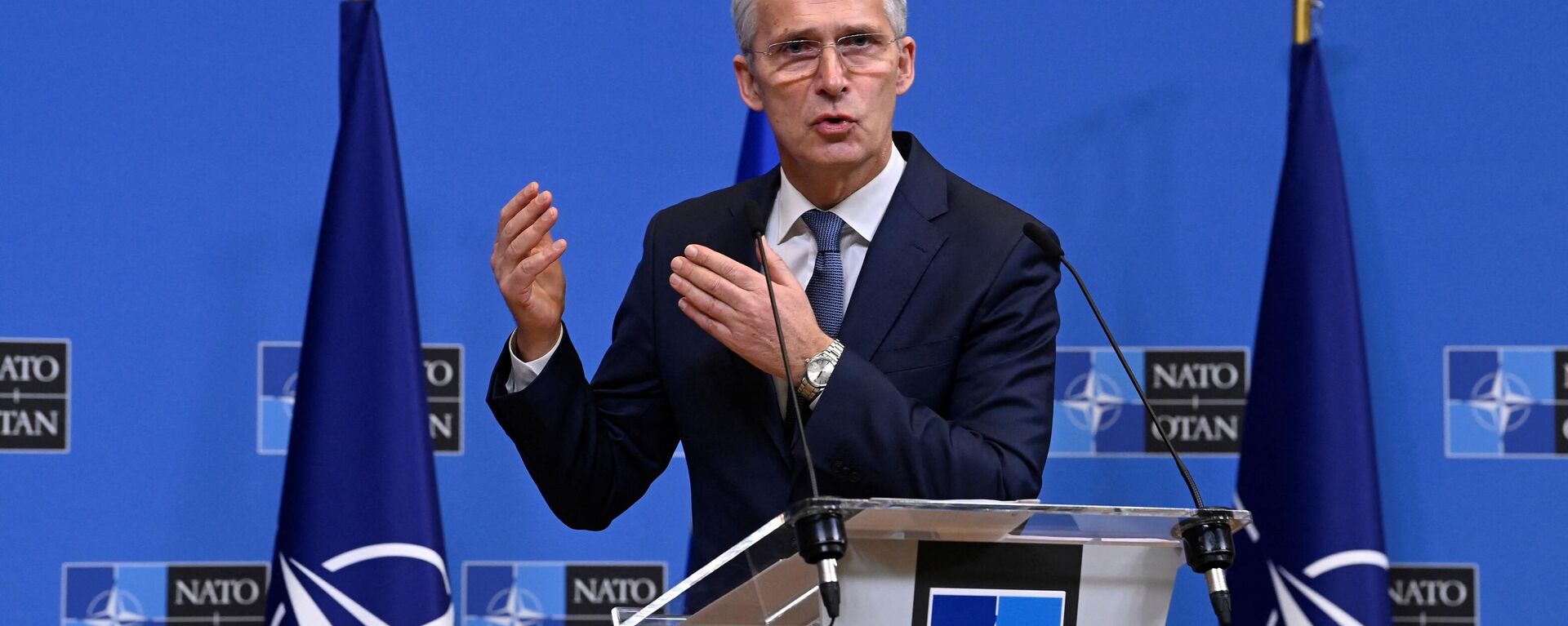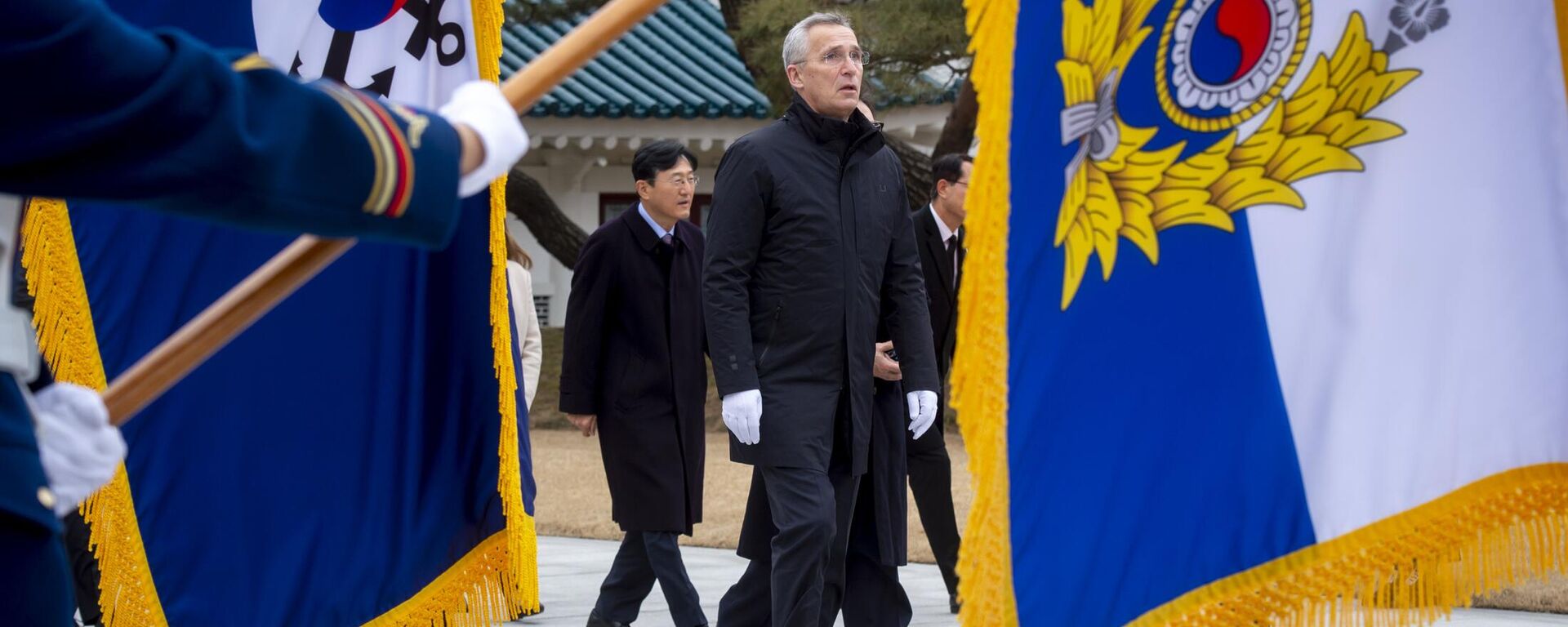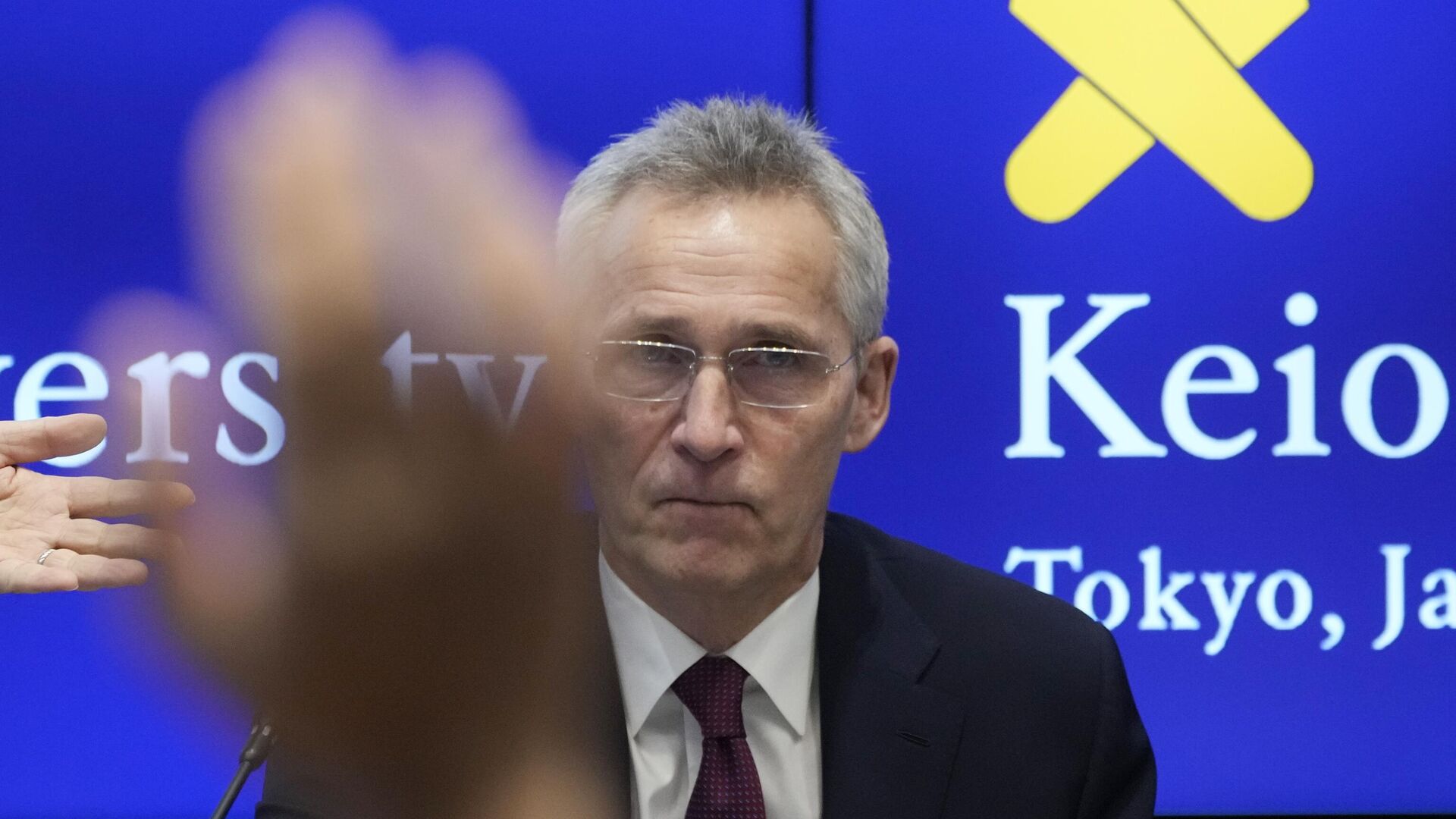https://sputnikglobe.com/20230202/mission-impossible-why-nato-is-failing-to-ukrainize-south-korea--japan-1106895673.html
Mission Impossible? Why NATO is Failing to ‘Ukrainize’ South Korea & Japan
Mission Impossible? Why NATO is Failing to ‘Ukrainize’ South Korea & Japan
Sputnik International
Tanks, artillery, armored personnel carriers, and even jet fighters and submarines are all produced and actively exported by South Korea. Japan also has significant military-industrial potential. NATO could use this to prolong the ongoing conflict in Ukraine.
2023-02-02T04:38+0000
2023-02-02T04:38+0000
2023-02-02T04:38+0000
nato
jens stoltenberg
japan
south korea
asia
https://cdn1.img.sputnikglobe.com/img/07e7/02/01/1106896006_0:319:3073:2047_1920x0_80_0_0_34aad0d28c7bf89af5280ea65dc342c4.jpg
However, the NATO Secretary General's visits to Seoul and Tokyo have done little to inspire optimism in Kiev and Brussels: no offensive weapons supplies from South Korea and Japan are on the table. NATO Secretary General Jens Stoltenberg delivered the same message to both countries: the security of Asia and Europe are closely intertwined, and if Putin were to win in Europe, Chinese military action in Taiwan would inevitably follow. Of course, this was never said outright, as it would supposedly send a "bad signal" to all "authoritarian countries", right down to Afghanistan - where the Taliban* have taken over after 20 years following a failed US-NATO mission. Ukraine, however, is obviously a different matter, so all progressive humanity must unite to prevent a bastion of democracy from falling.However, while the narrative that "Russia started it" and is therefore worthy of condemnation still prevails in the mass consciousness of Asian countries that have joined the Western coalition, calls to sacrifice themselves for a distant Eastern European country no longer evoke the same fervor. As a result, US and NATO attempts to drag their East Asian partners into the conflict in Ukraine by any means necessary are viewed with considerable skepticism.According to him, the fact that Pentagon Chief Lloyd Austin immediately followed Stoltenberg in visiting Seoul may indicate serious pressure on South Korea. Although they've tried not to advertise it, behind the scenes they probably continued to ask for more and more for Ukraine. However, the South Korean government has no reason to clash with Russia.Seoul has a very pragmatic approach to cooperation with NATO: several NATO member states have a great need to renew their military equipment fleets, and South Korea is ready to meet this demand. In addition, Seoul is even willing to supply equipment originally produced for the needs of its own military for the sake of the timely fulfillment of orders from Poland. And Seoul is counting on reciprocity in case it needs something for itself.Therefore, when NATO's Secretary General urges the country to fight for ideals and follow the example of Germany and Sweden, which have already abandoned their principles of not supplying weapons to a warring country, South Korea responds as Defense Minister Lee Jong-seop did during a press conference with his American counterpart:"I can only say that we are closely monitoring the situation in Ukraine."According to Cho Jin-goo, an associate professor at South Korea's Institute of Far Eastern Studies at Kyungnam University, Japan shares South Korea's assessment of what is happening in Ukraine as Russia's attempt to "change the status quo by force," but is equally reluctant to provide direct military support.He recalled that Japan, unlike South Korea, has long adopted the "three principles" of arms exports, one of which is a ban on shipments to countries involved in international conflicts. Therefore, even if Japan is willing to respond to NATO's requests, it will have to adjust them in one way or another, and this will take a long time.Japan is worried about the situation in Ukraine. The fact that the prime minister himself received Jens Stoltenberg is further proof of this. However, the real reason for Tokyo's concern is the growing power of China, while the "Russian threat" is only used as a pretext to convince its own citizens to increase defense spending. Nevertheless, even this decision has its critics.In his opinion, NATO hardly expects to get everything Kiev needs from South Korea and Japan, because they know the positions of the parties, but they continue to bend their line. If Japan is compensated for this by the coincidence of interests in the Indo-Pacific region, South Korea is very wary of attempts to pass off its assistance in replenishing US artillery supplies as almost direct supplies to Ukraine."South Korea takes NATO's calls a little more coldly than Japan does, because NATO doesn't have much to offer South Korea on its own. They don't have anything that we would be willing to trade, just some rhetoric. But that is not surprising, given the way NATO is structured. By and large, the United States is in charge, and the role of the Europeans is not so great. Even if a European state wanted to buy weapons directly from South Korea, it would be impossible without US approval," Yang Uk said.Therefore, if South Korea wanted to send a "message" to its NATO partners, the country’s president would meet Stoltenberg in Seoul. But the South Korean side seemed to have no such desire.* Organization is under UN sanctions for terrorist activities.
https://sputnikglobe.com/20230131/nato-throws-nuclear-bait-to-south-korea-1106851182.html
https://sputnikglobe.com/20230130/stoltenbergs-asia-trip-highlights-nato-appetite-for-global-anti-china-anti-russia-bloc-scholars-1106833507.html
japan
south korea
Sputnik International
feedback@sputniknews.com
+74956456601
MIA „Rosiya Segodnya“
2023
Sputnik International
feedback@sputniknews.com
+74956456601
MIA „Rosiya Segodnya“
News
en_EN
Sputnik International
feedback@sputniknews.com
+74956456601
MIA „Rosiya Segodnya“
Sputnik International
feedback@sputniknews.com
+74956456601
MIA „Rosiya Segodnya“
nato, asia, south korea, japan, jens stoltenberg
nato, asia, south korea, japan, jens stoltenberg
Mission Impossible? Why NATO is Failing to ‘Ukrainize’ South Korea & Japan
Tanks, artillery, armored personnel carriers, and even jet fighters and submarines are all produced and actively exported by South Korea. Japan also has significant military-industrial potential. NATO could use this to prolong the ongoing conflict in Ukraine.
However, the NATO Secretary General's visits to Seoul and Tokyo have done little to inspire optimism in Kiev and Brussels: no offensive weapons supplies from South Korea and Japan are on the table.
NATO Secretary General Jens Stoltenberg delivered the same message to both countries: the security of Asia and Europe are closely intertwined, and if Putin were to win in Europe,
Chinese military action in Taiwan would inevitably follow. Of course, this was never said outright, as it would supposedly send a "bad signal" to all "authoritarian countries", right down to Afghanistan - where the Taliban* have taken over after 20 years following a failed US-NATO mission. Ukraine, however, is obviously a different matter, so all progressive humanity must unite to prevent a bastion of democracy from falling.

31 January 2023, 10:51 GMT
However, while the narrative that "
Russia started it" and is therefore worthy of condemnation still prevails in the mass consciousness of Asian countries that have joined the Western coalition, calls to sacrifice themselves for a distant Eastern European country no longer evoke the same fervor. As a result, US and NATO attempts to drag their East Asian partners into the conflict in Ukraine by any means necessary are viewed with considerable skepticism.
"The US keeps leaking information that Russia is allegedly buying weapons from North Korea. But in the end, all this is meant to spoil relations between South Korea and Russia. So that they can then say that if you do that, then you should also supply ammunition to Poland. But (the possibility of their transfer to Ukraine - ed. Sputnik) will be an irritant in relations between Seoul and Moscow. Therefore, in order to maintain its line, South Korea should not take overly provocative actions. And in my opinion, it is trying to do so," Yang Uk, a PhD in Military Strategic Studies and an associate research fellow from the Center for Foreign Policy and National Security at the Asan Institute for Policy Studies, said.
According to him, the fact that Pentagon Chief Lloyd Austin immediately followed Stoltenberg in visiting Seoul may indicate serious pressure on South Korea. Although they've tried not to advertise it, behind the scenes they probably continued to ask for more and more for Ukraine. However, the South Korean government has no reason to clash with Russia.
"We would be willing to do this if we were interested. But it is one thing to sell arms to Poland, and another to intervene directly in the conflict in Ukraine. The latter is not in our interest at all. Yes, we are an ally of the US, there is a community of values, as our president says, so we have to take some symbolic measures. But the authorities will avoid any direct involvement. Washington has been very unhappy about this since the days of Crimea. But our logic is simple: no matter what Russia does, we need to maintain a certain level of relations with Russia to prevent it from moving closer to North Korea," Yang Uk explained.
Seoul has a very pragmatic approach to cooperation with NATO: several NATO member states have a great need to renew their military equipment fleets, and South Korea is ready to meet this demand. In addition, Seoul is even willing to supply equipment originally produced for the needs of its own military for the sake of the timely fulfillment of orders from Poland. And Seoul is counting on reciprocity in case it needs something for itself.

30 January 2023, 18:57 GMT
Therefore, when NATO's Secretary General urges the country to fight for ideals and follow the example of Germany and Sweden, which have already abandoned their principles of not supplying weapons to a warring country, South Korea responds as Defense Minister Lee Jong-seop did during a press conference with his American counterpart:
"I can only say that we are closely monitoring the situation in Ukraine."
According to Cho Jin-goo, an associate professor at South Korea's Institute of Far Eastern Studies at Kyungnam University, Japan shares South Korea's assessment of what is happening in Ukraine as Russia's attempt to "change the status quo by force," but is equally reluctant to provide direct military support.
"In my opinion, Japan is thinking more about participating in postwar reconstruction. Even if there is a direct request for weapons, the chances of Tokyo accepting it are slim. Japan has no such obligations under the mutual defense treaty with the United States. And the fact that the leaders of South Korea and Japan attended the NATO summit last year doesn't change much," Cho Jin-goo said.
He recalled that Japan, unlike South Korea, has long adopted the "three principles" of arms exports, one of which is a ban on shipments to countries involved in international conflicts. Therefore, even if Japan is willing to respond to NATO's requests, it will have to adjust them in one way or another, and this will take a long time.
Japan is worried about the situation in Ukraine. The fact that the prime minister himself received Jens Stoltenberg is further proof of this. However, the real reason for Tokyo's concern is the growing power of China, while the "Russian threat" is only used as a pretext to convince its own citizens to increase defense spending. Nevertheless, even this decision has its critics.
"Japan has important local and mid-term parliamentary elections in April, which, depending on the results, could create a crisis situation for Kishida's cabinet. Therefore, support for Ukraine at the diplomatic level will continue, but Tokyo is unlikely to be active in military assistance due to the difficult domestic situation," Professor Cho said.
In his opinion, NATO hardly expects to get everything Kiev needs from South Korea and Japan, because they know the positions of the parties, but they continue to bend their line. If Japan is compensated for this by the coincidence of interests in the Indo-Pacific region, South Korea is very wary of attempts to pass off its assistance in replenishing US artillery supplies as almost direct supplies to Ukraine.
"South Korea takes NATO's calls a little more coldly than Japan does, because NATO doesn't have much to offer South Korea on its own. They don't have anything that we would be willing to trade, just some rhetoric. But that is not surprising, given the way NATO is structured. By and large, the United States is in charge, and the role of the Europeans is not so great. Even if a European state wanted to buy weapons directly from South Korea, it would be impossible without US approval," Yang Uk said.
Therefore, if South Korea wanted to send a "message" to its NATO partners, the country’s president would meet Stoltenberg in Seoul. But the South Korean side seemed to have no such desire.
* Organization is under UN sanctions for terrorist activities.






